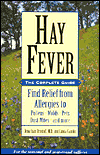Conventional medicine has some powerful weapons against hay fever but many people still turn to other forms of treatment. This chapter looks at all those that we have come across and tries to assess whether or not they may help you.
DIETARY SUPPLEMENTS FOR HAY FEVER:

Cod-Liver Oil and Fish Oils
One treatment worth trying is to take cod-liver oil (two teaspoons a day). This contains certain natural oils that affect the production and control of prostaglandins, chemical messengers produced by the body that have a subtle influence on the inflammation process.
By favoring the production of some prostaglandins over others, fish oils reduce the tendency to inflammation in the body, which is why they are often recommended for rheumatoid arthritis. Recent studies have shown that they are also valuable in asthma and possibly in hay fever. Since it is an inexpensive treatment, it is worth a try. Never take too much cod-liver oil, as it is a rich source of vitamin A, which is toxic in excessive doses. The effect of cod-liver oil on the prostaglandins takes about three months to become fully established, so do not expect any immediate benefits. To maintain the effect, you need to keep taking the oil.
 Evening Primrose Oil
Evening Primrose Oil
Evening primrose oil is likewise used for rheumatoid arthritis and has also been suggested as a useful supplement in hay fever. No one has yet carried out any tests to see if it really is effective, but it could he useful because it too has an impact on the prostaglandin balance in the body. It can be used in addition to cod-liver oil, and may augment the effects. Again, it takes about three months to build up its protective action.
Vitamin C, Ginseng, Cider Vinegar
High doses of vitamin C were once proposed as a treatment for hay fever, but medical trials have shown that they are not effective. Ginseng and cider vinegar have also been suggested, but there is no evidence for these either. Scientific trials with ginseng in healthy individuals have shown that it can have unpleasant side effects when taken for a prolonged period, such as diarrhea.
Honey and Bee Pollen
Eating honey in a honeycomb has also been suggested as a treatment, because it contains some pollen. There are no trials of this treatment but it does not seem likely to work. The pollen in honey will rarely be the sort of pollen that hay fever sufferers react to. We all swallow quite a bit of pollen during the spring and summer anyway, as it catches on the saliva in the mouth. So if eating pollen could cure or prevent hay fever, nobody would develop this annoying disease in the first place—there would be an unseen remedy all around us.
IONIZED AIR AND AIR FILTERS
Air ionizers work as cleaning devices, removing particles from the air. It has also been claimed, by some hay fever sufferers, that the stream of ions coming from the ionizer has a direct therapeutic effect. By facing the ionizer at close range, and so allowing the ions to flow over their face, they apparently experience relief from existing symptoms of hay fever, such as itchy eyes and a streaming nose. One German manufacturer has even produced a portable air ionizer, to be worn around the neck, that emits ions over the face.
There is nothing known about ions to suggest how this might work, and most doctors and scientists are dismissive of such claims. To the best of our knowledge, no one has tested the direct effects of ions on hay fever symptoms. However, claims of substantial improvement in hay fever have been made repeatedly, and there is probably no harm in trying the effects of ionized air, if you feel inclined to do so.
Stores that specialize in selling ionizers often have a demonstration model running, so you can try it out the effects are supposed to come on within a few minutes. Some ionizers may produce a small amount of ozone, which you could inhale if at close range. Should you experience any coughing or irritation of the nose or airways, then turn off the ionizer immediately.
HYPNOTHERAPY FOR HAY FEVER CONGESTION
A scientist in the United States has looked at the effect of hypnosis on relieving congestion of the nose in hay fever sufferers. He classified the patients studied into "high hypnotizable" and "low hypnotizable" subjects.
The "high hypnotizable" set showed considerable benefit from hypnotherapy sessions aimed at reducing their congestion. However, they also did well on sympathomimetic drops and on placebo drops. Compared with "low hypnotizable" patients, they did much better on all three treatments, and still showed the benefits a month later, when they had fewer hay fever attacks and were using their medicinal drugs less often.
It seems that "high hypnotizable" subjects are more susceptible to placebo effects (discussed earlier in this chapter), although other studies of placebos have not found this link.
The practical conclusion from all this is that if you respond to hypnosis, you will respond equally well to any treatment that you believe in, so hypnotherapy is probably a rather expensive option. Self-hypnosis might be worth trying if you are keen on totally natural cures. There are various tapes available that teach self-hypnosis—inquire in health food stores or try the Internet.

This article was excerpted with permission from the book:
Hay Fever, ©1993,2002
by Dr. Jonathon Brostoff & Linda Gamlin.
Reprinted with permission of the publisher, Healing Arts Press. www.InnerTraditions.com
About the Authors
Jonathan Brostoff, M.D., is Professor Emeritus of Allergy and Environmental Health at King's College in London and an internationally recognized authority on allergies.
Linda Gamlin was trained as a biochemist and worked in research for several years before turning to scientific writing. She specializes in writing about allergic diseases, the effects of diet and the environment on health, and psychosomatic medicine. Together they have coauthored Food Allergies and Food Intolerance and Asthma.



























